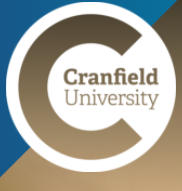
MSc in Astronautics and Space Engineering
Cranfield University, Cranfield


Cranfield University, Cranfield

MSc in Astronautics and Space Engineering
Cranfield University, Cranfield
Top choice of Indian students
It is a top-ranked institution in UK
Degree
Postgraduate
Duration
12
Course Type
With Co-op
Co-op education gives you real-world experience in a job related to your studies.
INR
32.88L
USD 38686
1st Year Tuition Fees
Opening Soon
Opening Soon